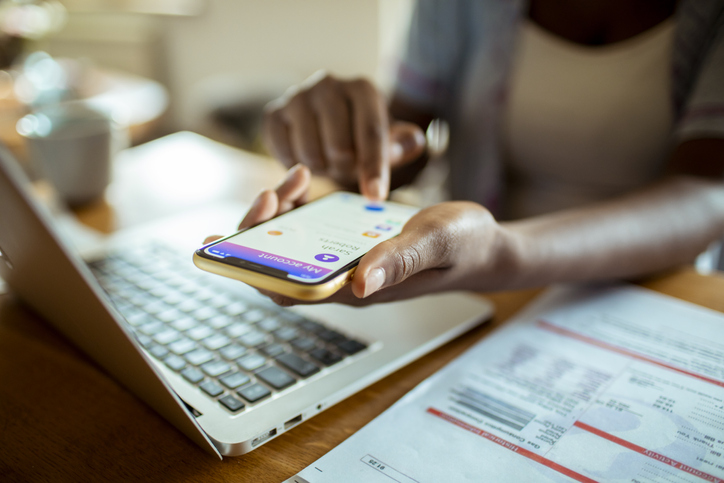
Source: Geber86 / Getty
Retail therapy is a term you’ve likely heard and even use from time to time. You have a bad day at work or a fight with a partner and treat yourself to some emotional spending. The term “retail therapy” was first penned by a Chicago Tribune writer in the 1980s named Mary T. Schmich – and she did not use the term in a positive way. Schmich wrote a piece called “A Stopwatch on Shopping” in which she talked about the dangers of Americans whipping out their credit cards to soothe themselves. Somehow, we’ve been convinced that retail therapy is a good thing – but, like Schmich tried to warn Americans several decades ago, it is a problem.
GO Banking Rates reports that 14 million Americans have more than $10,000 in credit card debt. And the implications of that reach beyond one’s bank account. The Money and Mental Health Policy Institute states that 46 percent of people with a debt problem also suffer a mental health problem. The same institute also found that 85 percent of survey respondents said financial stress made their mental health issues worse. It turns out that emotional spending is not a form of therapy – but it could be the reason you need a real therapist. Before it gets too far, here are ways to stop emotional spending.
Put It On Hold For Two Days

Source: svetikd / Getty
If you have a serious emotional spending problem, then you might need to wean yourself off rather than quit cold turkey. One way to do this is by still allowing yourself to look around in stores, but if you find something you want, put it on hold. You don’t need to buy it right now. Put it on hold for a couple of days and see if you still want it by the end of the hold period. Sometimes, you’ll find that you don’t – and that was just an emotional impulse. This simple step can save you a lot of money and help you recognize when emotional spending occurs (which we’ll touch on next).
Keep A Spending Journal

Source: Carolin Voelker / EyeEm / Getty
Those who struggle with emotional eating are often instructed to keep a food journal. A shopping journal can be just as effective for those struggling with emotional spending. In this journal, you will write down the days that you shop, as well as all of the other events that occurred that day. Every couple of weeks, review your journal. You might pick up on patterns – like reoccurring incidents that drive you to shop. This is how you’ll learn to identify your triggers (like interactions with a certain coworker or lunch with a certain relative). From there, you can create a game plan on how to avoid emotional spending when those triggers arise. Or, how to avoid those triggers entirely.
Find A Replacement Habit

Source: Luis Alvarez / Getty
Like with any habit you want to quit, from smoking to drinking to spending, you can’t just remove it. You have to replace it with a healthy habit. The craving or impulse won’t go away, so you need to find a productive way to satisfy it. With emotional spending, you want to alleviate negative feelings with a purchase. So, think of other activities that instantly elevate your mood. For example, maybe going to the dog park, talking to a friend on the phone or watching a funny show always makes you happy. These are free ways to soothe yourself that can replace shopping.
Get A Sponsor + Join A Group

Source: SDI Productions / Getty
There are groups that help those with a shopping addiction. These are called Spenders Anonymous groups. If you feel that your emotional spending is causing real harm to your life, it might be time to join one. You can also get a sponsor – either an official one from a group, or a friend. This is someone you can call when you are struggling and feel the impulse to shop. They can talk you down and provide alternative solutions.
Do A Mass Unsubscribe

Source: Brothers91 / Getty
If you’re a big spender, then you’ve probably subscribed (with or without your knowledge) to the newsletters of many brands over the years. They collect your email address when you check out, or you hand it over to get a coupon code in exchange. Now your inbox is flooded with promotions and offers. But, these can be triggering for emotional spenders. Sit down and do a mass unsubscribe from any retail senders.
Write A List Of Needs And Wants

Source: Xavier Lorenzo / Getty
Create a list of the things you need on a regular basis and the things that you want. Spend some time with this list and critically evaluate it. You might find that you move a lot of items from the “need” side to the “want” side as you become more aware of your triggers. Give yourself this assignment: look at every item on your “need” list and make a strong argument for why it’s a necessity. If you can’t, then it goes to the “want” side. You can still buy things that you want. However, once it’s clear that you don’t need those things, you can be more conscious of your mood when you buy them. So items like clothes, shoes or décor – these are on your “want” list, and it’s best to only shop for these things when your mood is stable.
Stick To A Budget

Source: Geber86 / Getty
While it is important to get to the root of your spending issue, that doesn’t happen overnight. In the meantime, it’s important to mitigate the financial damage of emotional spending. Create a strict budget, and use one of the money apps MADAMENOIRE reviews here. These will help you allocate a certain amount of funds to each category of your budget, and notify you when you go over.









